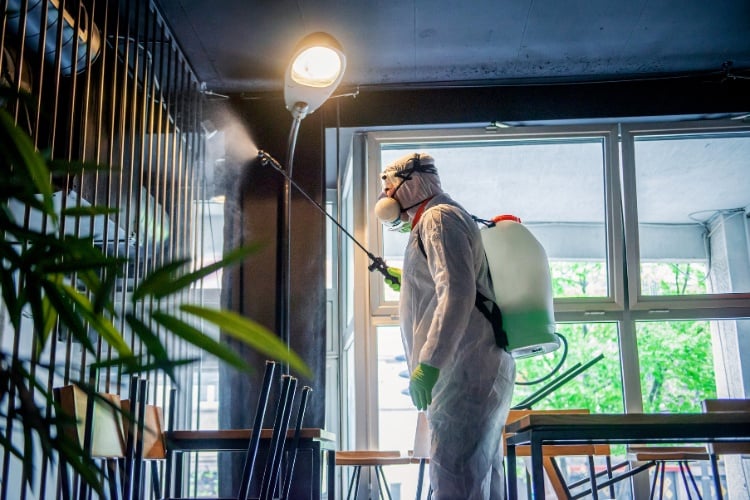The restaurant industry has always adhered to strict health and safety measures. Many of the additional guidelines put into place as the result of the pandemic did not phase restaurant operators or staff members because hand-washing, regular glove changes, and food handler safety were already second nature.
However, the need for increased volume of cleaning time was not necessarily something operators were prepared for-particularly since most restaurants operated for months on a skeleton crew. Electrostatic disinfectant sprayers are one safety solution the restaurant industry is starting to consider after more than 60 years in other areas, including agriculture, automotive, and tanning industries.1
What exactly IS electrostatic disinfection? Commercial Cleaning Corp says:
Electrostatic spray surface cleaning is the process of spraying an electrostatically charged mist onto surfaces and objects. Electrostatic spray uses a specialized solution that is combined with air and atomized by an electrode inside the sprayer. Subsequently, the spray contains positively charged particles that are able to aggressively adhere to surfaces and objects. Because the particles in the spray are positively charged, they cling to and coat any surface they’re aimed at.2
Essentially, surfaces are uniformly coated because the charged mist is attracted to all negative surfaces and surfaces already covered with disinfectant will repel the spray. These systems include benefits such as touchless application, portable, easy to use, and cost effective.
 Innovacyn, Inc. describes their SKV Disinfectant Atomizing Sprayer as “offering 360 degree coverage” because the application system maximizes the effectiveness of the disinfectant with a wraparound effect on the targeted surface.3 The spray delivery optimizes the cleaning process by reducing the time it takes to cover and disinfect surfaces and awkward or hard-to-reach places, as well as controls the amount of disinfectant used in order to prevent overuse or waste.
Innovacyn, Inc. describes their SKV Disinfectant Atomizing Sprayer as “offering 360 degree coverage” because the application system maximizes the effectiveness of the disinfectant with a wraparound effect on the targeted surface.3 The spray delivery optimizes the cleaning process by reducing the time it takes to cover and disinfect surfaces and awkward or hard-to-reach places, as well as controls the amount of disinfectant used in order to prevent overuse or waste.
On top of all their other restaurant’s health and safety precautions, Ivar’s, a Washington staple, has a trained crew to disinfect and apply Hospital Grade Disinfectants and Food Safe Protectants on all surfaces overnight, including tables, chairs, floors window sills and doors when there are no diners on premise.
As regulations begin to ease and on-premise dining becomes available, restaurants may want to create an action plan for how they will maintain an aggressive cleaning regime when their dining room opens up. Restaurants will have to decide on a case by case basis if an electrostatic disinfectant sprayer is right for their business. Some of the disinfectants in these systems can only be used in non-food environments, but are highly recommended for thoroughly disinfecting surfaces in public spaces such as the waiting area around the host stand, the dining room, and the bathrooms. Additionally, there are a handful of those that are food-safe.4
Electrostatic disinfectant spray systems can save a restaurant time and money, while offering the peace of mind that comes from a set of health and safety solutions proven to effectively protect diners.
Sources:
-
Cleaning & Maintenance Management: Q&A: Electrostatic Spray Technology
-
Commercial Cleaning Corp.: What Is Electrostatic Disinfection and How Does It Work?
-
Innovacyn, Inc.: Home Page
-
Fikes: How to keep your customers and employees safe with electrostatic disinfection and bioprotect?





.png)

.png)
